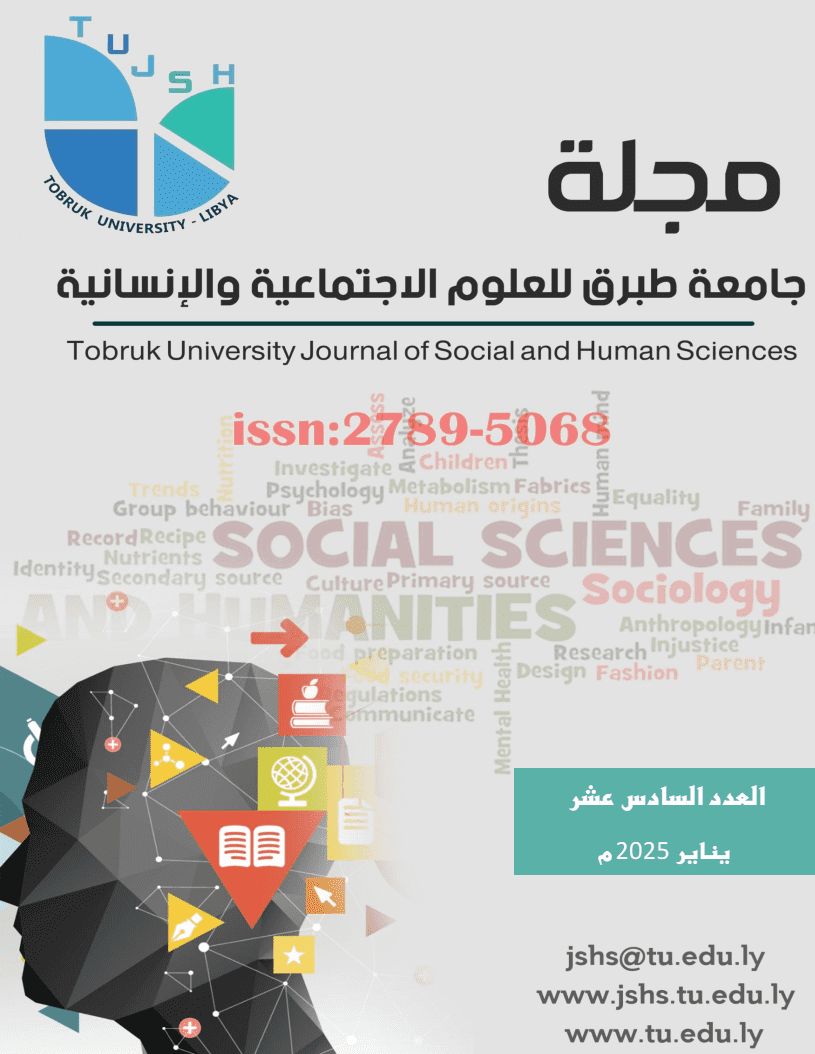Forgiveness and repentance in Arabic poetry “Al-A’sha, Abu Al-Hindi, and Abu Nawas”
دراسة تطبيقية مقارنة
DOI:
https://doi.org/10.64516/bsw5jn80Keywords:
Unconsciousness, remorse, religious beliefs, alcohol, heresyAbstract
The research deals with three poets (Al-Asha, Abu al-Hindi, and Abunuwas) because these poets were known for their love of wine and the subsequent obscene and indecisive adventures that abound in their poetry and news.We read poems that reveal rebellion and transgression of the usual values, and various factors contributed to pushing them to this behavior, including factors related to the environment and upbringing, and some related to the way in which the human being was born, and when the human soul varies from one soul to another, and varies even within the same soul, it does not stay on one pace, so it is good and pure and malicious and evil The poet Al-Asha, who lived in Jahiliyyah for a large part of his life, and wine was not forbidden, but the vast majority drank it, but Al-Asha was fond of it and immortalized this love in his poems, and wine is the “mother of evils.” Al-Asha was fond of forbidden desires, and because of the wine, he postponed his repentance. He lived until the seventh year of the Hijrah, but he did not die as a Muslim, but died in the year in which he wanted to declare his Islam, and his soul, which was raised on obscenity and immorality, had an awakening, and it seems that it was as fluctuating as his fluctuating faith, as we have known. However, he wrote wonderful verses in praise of the Prophet, describing his endurance of the hardship of traveling and his longing to meet the Prophet, and mentioned the Prophet's qualities and his commandments of righteousness and faith, and that those who do not follow the Prophet's commandments will leave this world without a supply of food, and will be doomed to regret. As for Abu al-Hindi, he openly expressed in his poetry his love for wine and its aftermath, including his verses asking for pardon and forgiveness. Abu Nawas went so far as to address the greatness of matters when he dared to deny the constants of Islamic belief, denying the resurrection, heaven and hell, and the pressure of the grave, as well as indulging in immorality and obscenity; however, his poems are not devoid of remorse and requests for forgiveness, which we assume were written at intervals when he was experiencing moments of remorse
Downloads
References
1. الأصفهاني، الأغاني ج 9 ، ج20 ، شرحه وكتب هوامشه عَبد أ. علي مهنَّا، دار الفكر ط2، د.ت.
2. الأعشى الأكبر، ديوانه، اعتنى به وشرحه عبدالرحمن المصطاوي، دار المعرفة بيروت، ط1، 2005.
3. إيليا حاوي، فن الشعر الخمري وتطوره عند العرب، دار الثقافة، بيروت د:ت.
4. الخطيب البغدادي، تاريخ بغداد، الخانجي وبغداد والسعادة ، ج7، 1931
5. ابن خلكان، وفيات الأعيان، ج1 ، تحقيق محمد محيي الدين عبدالحميد، مكتبة النهضة العربية، القاهرة ط1 1948.
6. رجاء السيد جوهر، فن الرجز في العصر العباسي، 1990
7. زكي مبارك ، الموازنة بين الشعراء، ط2، دار الكتاب العربي، 1936.
8. زكي مبارك، ( الجوانب الجدية في شعر أبي نواس) الهلال، القاهرة، أغسطس، 1936 .
9. زهير عبدالله المدخلي، فن المديح عند الأعشى( دراسة فنية)، رسالة
10. ماجستير، كلية الدراسات العليا، الجامعة الأردنية، 2009.
11. شوقي ضيف، العصر العباسي الأول، ط6، المعارف، القاهرة ، 1966.
12. شوقي ضيف، العصر الجاهلي، ط8، القاهرة ، دار المعارف، 1960
13. طه حسين، حديث الأربعاء، ج2، القاهرة ، دار المعارف د:ت،
14. عبدالله الجبوري، ديوان أبي الهندي وأخباره، النجف، مطبعة النعمان، 1969
15. ابن عساكر، تاريخ مدينة دمشق، ج13، د.ت.
16. علي أحمد الزبيدي ، زهديات أبي نواس ، مطبعة كوستانسوماس، القاهرة ،1959
17. عمر أبو عاذرة، كاريزما السلم الوظيفي، دار الخليج، 2017.
18. ابن قتيبة، الشعر والشعراء، ج2، دار الثقافة، بيروت، د.ت.
19. كارل بروكلمان، تاريخ الأدب العربي، ج2، نقله إلى العربية عبدالحليم النجار، المعارف، القاهرة، 1974.
20. محمد شاكر الكتبي، فوات الوفيات، تحقيق إحسان عباس، دار صادر بيروت ط1 1974 ج3
21. المرزباني، الموشح في مآخذ العلماء على الشعراء، تحقيق محمد حسين شمس الدين، 1995.
22. مصطفى الشوري، الشعر الجاهلي- تفسير أسطوري- ط1، الشركة المصرية العالمية للنشر، القاهرة، 1996.
23. ابن منظور ، أخبار أبي نواس، تحقيق إبراهيم الأبياري ( ملحق مطبوع مع الأغاني الجزء التاسع والعشرون والجزء الثلاثون) دار الشعب، 1953.
24. ابن منظور ، لسان العرب مذيل بمعجم المصطلحات العلمية والفنية، إعداد وتصنيف يوسف خياط ونديم مرعشلي، دار لسان العرب، د.ت.
25. أبونواس، ديوانه ، تحقيق أحمد عبدالمجيد الغزالي، دار الكتاب العربي، بيروت، 1984.
26. أبونواس، ديوانه ج1، رواية حمزة الأصفهاني، تحقيق إيفالد فاغنر، لجنة التأليف والترجمة والنشر، فسيبادن والقاهرة ، 1958.
27. ياسين يوسف عايش، قصيدة الأعشى في مدح الرسول الكريم وأخبارها ، قسم اللغة العربية، الجامعة الأردنية
Downloads
Published
Issue
Section
License
Copyright (c) 2025 د. أمينة عبدالله الحشاني (Autor/in)

This work is licensed under a Creative Commons Attribution 4.0 International License.








